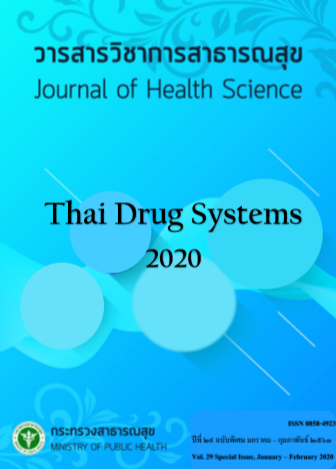Political Economy of Thailand Drug System: What Lessons Learned?
Keywords:
political economy, health economic, drug system in ThailandAbstract
The political economy, which explains the relationships between individuals and society and between markets and the state, have direct and indirect influences over the health and drug system. This article analyzed the influence of political economy on the drug system in Thailand, by reviews of relevant literature and drew a few lessons. As medicine is one of the four essential needs for human lives; in the era of absolute monarchy, medicines were used as a governing tool to gain loyalty and goodwill among the populace subjects. In the 1932 Siamese Revolution from absolute monarchy to a constitutional monarchy, medicine and public health were not one of the six policy pillars proposed by the Revolutionaries; however every government had given importance to the advancement of the public health system by expansion of public health facilities in every province, district and sub-district nation-wide. In parallel, extension of financial risk protection to the vulnerable population (such as the low income households, the disable, elderly and children under 12 years) and the formal sector public and private employees provided financial access by citizens. Until 2002 Universal Health Coverage was achieved for the whole population. In the Thai drug system; Thailand has followed western allopathic medicine since the time of major reform in the era of King Rama V (1853-1910). Thailand has been under the influence of western countries in terms of academia, business and politics. However various Thailand public health champions had boldly challenged these western influences using wisdom and courage. National List of Essential Medicines was adopted and effectively implemented following the principles recommended by the World Health Organization. Further national drug policies enforced the use of reference drug price for public procurement which contains drug expenditure and improves efficiency. The 1998 drug procurement scandal masterminded by politician was publicized by civil society organizations which led to prosecution and imprisonment. Additionally the pharmaco-vigilance was fully established to monitor adverse drug event and result in immediate withdrawal of certain medicines. Despite pharmaceutical industry filed a law suit to the Administrative Court to retract the withdrawal of Phenylpropanolamine; the court dismissed the case. Furthermore for public health emergency which requires the use of certain expensive patent drugs, with bold leadership, Thailand implemented the compulsory license through legal provisions by the Thai law in the height of political pressure from the US government and pharmaceutical giants. In contrast, the prohibition of excessive and irrational use of Glucosamine was brought to the Administrative Court by Civil Servant Association which, controversially, the Court had ruled its continued use. Drug policies emerged under different political systems. For example, the National List of Essential Medicine and the reference drug price were established in the partial democracy, the Universal Coverage Scheme was launched in the full democracy, and the use of compulsory licensing was initiated by a coup d’etat government. The key deficiency is the lack of progress in pharmaceutical sciences and related disciplines which support research and development of new medicines or formularies; as more than half were imported finished products and all active pharmaceutical ingredients are imported. The Thai traditional medicine and herbal remedies are confined by a conservative mindset and at early stage of development.
Downloads
Downloads
Published
How to Cite
Issue
Section
License
Copyright (c) 2020 Journal of Health Science - วารสารวิชาการสาธารณสุข

This work is licensed under a Creative Commons Attribution-NonCommercial-NoDerivatives 4.0 International License.







